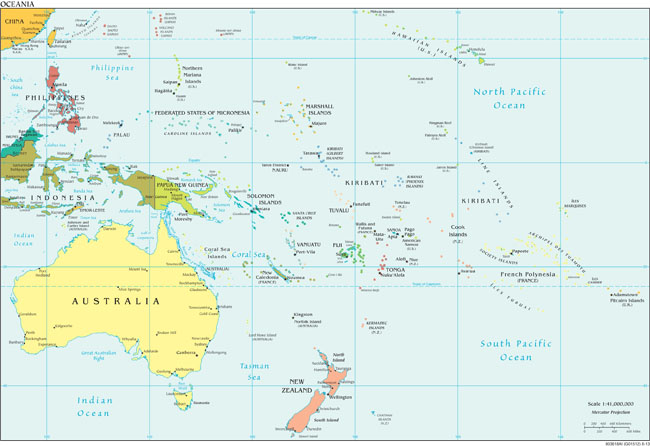Oceania in Chinese Posted by sasha on Mar 23, 2016 in Uncategorized
We’ve been all over the world on our ongoing Chinese geography lesson. In case you’ve missed any of the past posts, here are the links for you to bookmark:
- 50 US States
- Canadian Provinces, Territories, and Cities
- North American Countries
- South American Countries
- European Countries
- Asian Countries
- African Countries
We’ve still got two continents to cover – Antarctica (南极洲 – nán jí zhōu) and Australia (澳洲 – Ào zhōu), also sometimes referred to as Oceania (大洋洲 – dà yáng zhōu). It’s not just a clever name, as this region is surrounded by oceans. This is the smallest continent in the world, consisting of the Australian mainland along with many other islands. Some are quite large, such as New Zealand, while others such as Nauru are tiny.
There are 14 independent countries in Australia/Oceania. Here they are in English, Chinese and pinyin:
English |
Chinese |
Pinyin |
Australia |
澳大利亚 |
Ào dà lì yǎ |
Fiji |
斐济 |
Fěi jì |
Kiribati |
基里巴斯 |
Jī lǐ bā sī |
Marshall Islands |
马绍尔群岛 |
Mǎ shào ěr qún dǎo |
Micronesia |
密克罗尼西亚 |
Mì kè luó ní xī yà |
Nauru |
瑙鲁 |
Nǎo lǔ |
New Zealand |
新西兰 |
Xīn xī lán |
Palau |
帕劳 |
Pà láo |
Papua New Guinea |
巴布亚新几内亚 |
Bā bù yǎ xīn jǐ nèi yǎ |
Samoa |
萨摩亚 |
Sà mó yǎ |
Solomon Islands |
所罗门群岛 |
Suǒ luó mén qún dǎo |
Tonga |
汤加 |
Tāng jiā |
Tuvalu |
图瓦卢 |
Tú wǎ lú |
Vanuatu |
瓦努阿图 |
Wǎ nǔ ā tú |
As it accounts for a vast majority of the area and the population of the continent, let’s take a closer look at Australia. The country is composed of six states and ten territories. Two territories are on the mainland – the Australian Capital Territory and the Northern Territory – while the others are located offshore. Outside of government, the ACT and the Northern Territory are often treated like states because of their large populations and the fact that they’re on the mainland bordering other states. Here are the six states plus the two almost states in Chinese:
New South Wales |
新南威尔士州 |
Xīn nán wēi ěr shì zhōu |
Queensland |
昆士兰 |
Kūn shì lán |
South Australia |
南澳大利亚 |
Nán ào dà lì yǎ |
Tasmania |
塔斯马尼亚 |
Tǎ sī mǎ ní yǎ |
Victoria |
维多利亚 |
Wéi duō lì yǎ |
Western Australia |
西澳大利亚 |
Xī ào dà lì yǎ |
Australian Capital Territory |
澳大利亚首都地区 |
Ào dà lì yǎ shǒu dū dì qū |
Northern Territory |
北领地 |
Běi lǐng dì |
While we’re at it, we might as well learn the five biggest cities in Oz in Chinese:
Sydney |
悉尼 |
Xī ní |
Melbourne |
墨尔本 |
Mò’ěr běn |
Brisbane |
布里斯班 |
Bù lǐ sī bān |
Perth |
珀斯 |
Pò sī |
Adelaide |
阿德莱德 |
À dé lái dé |
If you’re from down under, it might not be a bad idea to learn a bit of Chinese, as more and more people from the Middle Kingdom are heading to Australia. And they’re not just going on holiday – many Chinese are choosing to study, work, and even buy property in the land of kangaroos. Just watch this short news clip from CCTV about the booming Chinese real estate market in Oz:
Now that we’ve covered all seven continents – there really isn’t much to say about Antarctica (sorry, penguins) – our geography lesson is finished! Now you can go anywhere in the world and know where you are in Chinese. Maybe next month we’ll look beyond our atmosphere for more new Chinese lessons.

Build vocabulary, practice pronunciation, and more with Transparent Language Online. Available anytime, anywhere, on any device.
About the Author: sasha
Sasha is an English teacher, writer, photographer, and videographer from the great state of Michigan. Upon graduating from Michigan State University, he moved to China and spent 5+ years living, working, studying, and traveling there. He also studied Indonesian Language & Culture in Bali for a year. He and his wife run the travel blog Grateful Gypsies, and they're currently trying the digital nomad lifestyle across Latin America.





Leave a comment: